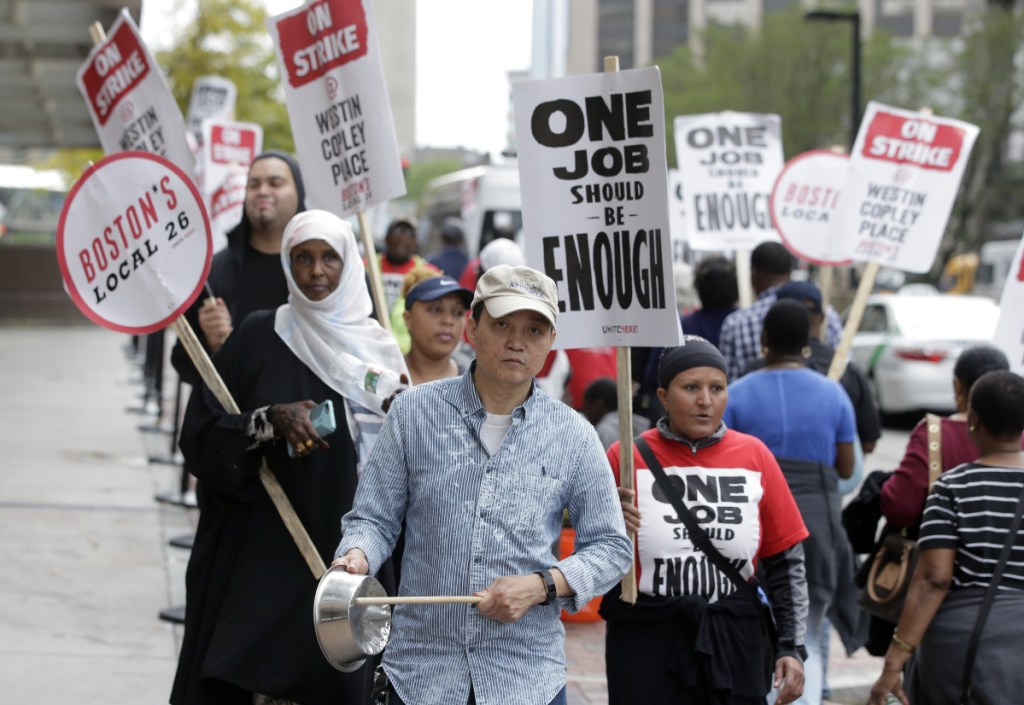BOSTON — Robots delivering room service, check-in kiosks with facial recognition technology and “smart” speakers that serve as an in-room concierge.
The hotel of the not-so-distant future sounds like something out of a sci-fi novel, but it’s drawing real-world anxiety for some of the thousands of Marriott hotel workers on strike across the U.S. this month.
“I’m not against technology,” said Juan Eusebio, a 32-year-old doorman at the W Hotel in Boston and a member of the local union’s negotiating team. “I just want any technology that comes in to help us do a better job, not take our jobs away.”
How much input workers have as these and other technologies are introduced is among the core issues for the nearly 8,000 workers that have walked off their jobs at Marriott hotels from Boston to Honolulu since last week, union officials say.
Workers are also seeking changes to housekeeper workloads, particularly as “green” programs allowing guests to opt out of cleaning services become more popular. They’re also pushing for job protections for restaurant and bar staff as more hotels shutter those facilities.
Marriott, the world’s largest hotel operator, declined to comment for this story, but has said it’s “disappointed” workers have decided to strike.
Marriott workers walked out of hotels across Boston last week, followed by workers in San Francisco, San Diego, Oakland, San Jose, Detroit and Honolulu. Some 6,000 workers at 26 hotels in Chicago also went on strike last month, though most have returned to work after reaching new contracts with Marriott, Hilton, Hyatt and other operators.
Marriott has 5,000 hotels in the U.S. and Canada, of which about 40 are impacted by the current labor union negotiations. Maine’s hotels did not appear to be among those.
The union’s proposals vary between cities, but generally workers are seeking better compensation to keep up with soaring housing and living costs, said D. Taylor, international president of Unite Here.
Unions agreed to forgo pay raises during the lean recession years to preserve jobs, but now that the industry is reaping record profits in some cities, they want to share in the windfall, he said.
In August, Marriott reported second quarter profits increased 25 percent from the previous year to $610 million.
“We think the largest, most profitable hotel company in the world can afford it,” Taylor said. “Our members are working two or three jobs just to make ends meet.”
On other fronts, the union wants Marriott to address the impact its “Make a Green Choice” program has had on housekeepers.
The almost decade-old program, which is similar to those offered by other hotel companies, allows guests to earn reward points or other perks for declining housekeeping services. The union, in a report last month, said the program reduces housekeeper hours and leads to more injuries because rooms take more effort to clean once guests depart.
Marriott declined to say how much the green program has saved the company, but said in a 2017 report its environmental and sustainability efforts have, overall, lowered energy use by 13 percent and water use by nearly 8 percent from 2007 levels.
“This is a labor reduction program masquerading as an environmental program,” said Brian Lang, head of the union’s local chapter in Boston, where he says union housekeepers have seen their hours reduced 15 to 20 percent because of the program.
On the introduction of new technology, workers want at least 180 days notice before any new technology is rolled out. They want members have a chance to be trained on the technology and “fair severance” if they’re ultimately laid off, said Taylor, the national union president.
Casino giants MGM and Caesars in Las Vegas agreed to similar concessions on technology with their unions earlier this year, but Unite Here officials declined say how the tech or environmental program concerns were resolved in the recently concluded Chicago negotiations.
How many hotel workers are already being impacted by new technologies also isn’t clear.
Some hotels in San Francisco have eliminated room service units entirely because of the popularity of meal delivery services like Grubhub and Uber Eats, according to Anand Singh, president of Unite Here’s San Francisco local chapter.
And rideshares like Uber and Lyft have also hit hotel workers’ livelihoods, said Eusebio, a Boston doorman.
The Chelsea, Massachusetts resident said he’s seen his earnings drop 40 percent over the last three years in large part because he’s not earning the tips he used to for hailing taxicabs or loading luggage for guests now that many are using rideshares.
Eusebio said he wants the company to boost doormen wages from $10 an hour to $18 an hour to account for the new reality.
In Honolulu, Boram Shin is concerned about her future as a front desk agent at the Sheraton Waikiki as the Hawaiian resort prepares to roll out new check-in technology.
The 29-year-old said staff is being trained on “Mobile Key,” an app that lets guests use their smartphones to check-in and, at some locations, gain access to their rooms without ever having to use a key card – or visit a front desk.
“It puts us in a difficult position,” Shin said. “If most of us lose our jobs, we don’t have a ton of choices on the island.”
Send questions/comments to the editors.



Comments are no longer available on this story